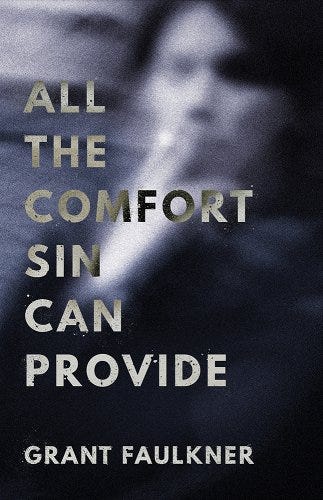Dear Reader,
Here is this week’s grab bag of writing-ish thoughts. Because life is a grab bag. You grab. You get a bag (and sometimes baggage) … (and sometimes other stuff).
Because anxiety (irrational and rational)
It’s interesting that the word “irrational” is often paired with “anxiety.” Sure, people imagine and project many anxieties on the world, but even so, who is to say they aren’t rational? To call an anxiety irrational is to dismiss it because we tend not to like the irrational (even though the irrational fills so much of our lives, and sometimes in good ways).
“Rationality” is often used as a blunt hammer. There’s no doubt the pairing of irrational with anxiety comes from a long lineage of men adept at gaslighting and dismissing the emotions of the women in their lives. We also have a cultural ethos to tamp down our fears, to get over them, to proceed with a stiff upper lip—to build a life with the building blocks of rationality.
I wonder, though, if “irrational” anxiety needs to be honored more. Don’t we need a healthy dose of irrational anxiety to keep real dangers at bay? Because how to tell if the fear of an apocalyptic nuclear war or the fall of our democracy or the betrayal of a friend or lover is irrational or rational? Sometimes we don’t know how we know things, we just know them. Sometimes our efforts to rationalize things are full of irrationality.
I’m a fan of the mystical powers of intuition. I think we need to listen more to our hunches, our inklings, our supposed irrationalities.
It takes practice to become a skilled intuitionist, though. Here’s a test for your anxieties: how many of them are irrational? How do you know?
Because pleasure takes so many forms
It’s odd to say, but pleasure doesn’t really get its due. We fixate on the physical side of pleasures, carnal pleasures or gustatory pleasures or psychotropic pleasures, but it’s really the small pleasures that count.
The pleasure of a dog licking your hand. The pleasure of a dark room. The pleasure of digging a hole. The pleasure of blowing tufts of dandelion seeds. The pleasure of hot water on your hands while doing the dishes. The pleasure of saying something you’re not supposed to say. The pleasure of stepping into a puddle. The pleasure of messiness (too seldomly experienced by the adult species). The pleasure of spilling (now extinct for most). The pleasure of sitting in a bean bag. The pleasure of whistling.
Pleasure leads to pleasure. And then it’s multiplied by more pleasure.
If you don’t practice pleasure, you lose the ability to experience it. And there’s no pleasure in that.
Because a single quote can rock your world
“Most of my writing usually feels to me like a bad idea, which makes it hard for me to know which ideas feel bad because they have merit, and which ones feel bad because they don’t. Often I watch myself gravitating toward the bad idea, as if the final girl in a horror movie. But somewhere along the line, from my heroes, whose souls were forged in fires infinitely hotter than mine, I gained an outsized faith in articulation itself as its own form of protection.”
~ Maggie Nelson
(By the way, I’m obsessed with Maggie Nelson’s writing)
Because a writer's notebook
I just encountered this jotting in my notebook (which is full of disjointed notes for works-in-progress, works-not-in-progress, and works-never-to-be, which I type up each weekend):
“Derrida/Foucault – friendship/mourning – De Beauvoir essay, New Yorker”
I have no idea what to do with it. None of the words trigger anything. It sounds like it’s really important. But I have to say goodbye to this once important thought that wasn’t meant to be born into this world …
Because a Haiku
the fraying tint of the clouds— dust rising on the road
Because napping takes practice
I could be a professional napper. If there were napping competitions around the world with competitions like “napping in public places” or “the quickest power nap,” I’d be among the top-ranked nappers (I say this with complete modesty because it’s true).
I religiously take an afternoon nap. I sometimes take two naps a day. I’ve even taken three. Maybe more. Catnaps. Power naps. They’re a little like doing drugs, except I exit refreshed.
I recently interviewed Jean Chen Ho, who just came out with the wonderful novel (that’s really a collection of short stories) Fiona and Jane, and she said she frequently takes a nap after reading academic work in her PhD program in order to process it. That struck me as a brilliant reading strategy.
I love the intersections of sleep and creativity and thinking, so I was happy to see this article about how sleep unlocks creativity.
The article details an experiment based on a method that Thomas Edison and Salvador Dali practiced to capture the creative virtues of sleep at its onset. They took naps while holding an object in their hand. The said object would fall and make noise as their muscles relaxed at the transition to sleep, waking them up in time to write down the illuminations occurring during this pre-sleep period.
I don’t do anything like that. I just like to nap.
Because Prompts Take Us to New Places
Seen while walking the streets of LA one day …
Use this photo as a prompt, as a random catalyst, as an igniter for any writing project you're working on.
Or … write a story about this photo in less than 250 words and share it.
Because brilliance
Last week, I wrote a bit about how I like flash fiction because of how the very size of the story invites unconventional strategies.
Here’s one of my favorite examples of that—using the wonderful “Mad Lib” form I delighted in as a kid: the brilliant Kim Magowan’s 100-word story, Mad Lib.
All the Comfort Sin Can Provide
If you like this newsletter, please consider checking out my recently released collection of short stories, All the Comfort Sin Can Provide.
Lidia Yuknavitch said:
“Somewhere between sinister and gleeful the characters in Grant Faulkner’s story collection All the Comfort Sin Can Provide blow open pleasure—guilty pleasure, unapologetic pleasure, accidental pleasure, repressed pleasure.”
Grant Faulkner is executive director of National Novel Writing Month and the co-founder of 100 Word Story. He’s the author of Pep Talks for Writers: 52 Insights and Actions to Boost Your Creative Mojo and the co-host of the podcast Write-minded. His essays on creative writing have appeared in The New York Times, Poets & Writers, Lit Hub, Writer’s Digest, and The Writer.
For more, go to grantfaulkner.com, or follow him on Twitter at @grantfaulkner.



